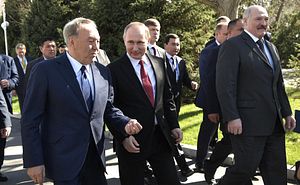Ibrahim Kalin, a spokesman for Turkish President Recep Tayyip Erdogan, reportedly said Thursday that Russia had proposed deploying troops from Kazakhstan and Kyrgyzstan to monitor the de-escalation zones in Syria agreed to last month.
RIA Novosti confirmed the report, with the head of the State Duma defense committee, Vladimir Shamanov, saying Russia was in talks with Kazakhstan and Kyrgyzstan.
In early May, representatives from Iran, Russia, and Turkey agreed to set up four so-called de-escalation zones within which there would be a halting of hostilities between rebel groups and Bashar al-Assad’s forces. The agreement was reached during a summit in Astana, Kazakhstan but neither the Syrian government nor rebel groups signed on.
Syrian Foreign Minister Walid al-Moallem said in early May, as the agreement was supposedly going into effect, “We do not accept a role for the United Nations or international forces to monitor the agreement.”
The proposal to deploy Central Asian forces makes a (small) degree of sense (if we ignore the questions of capability and experience entirely). Kazakhstan and Kyrgyzstan are both members of the Collective Security Treaty Organization, a potential vehicle for such a deployment. While the Syrian government, via the foreign minister, rejected the idea of international forces, it may change its tune for Russia’s pet military alliance. As one Syrian opposition leader, Ilyan Masaad, told RBC, the deployment would not happen without Damascus’ consent. He indicated three criteria for picking the source of the monitors: a Muslim country, not involved in the conflict and amenable to Moscow and Damascus’ position. Kazakhstan and Kyrgyzstan fit that bill.
But neither Astana nor Bishkek has any real experience in the field of monitoring a ceasefire in the midst of a horrendous civil war.
Both countries have participated in UN peacekeeping operations, but in a miniscule capacity. As of May, for example, Kazakhstan has an active contribution of five military experts to UN missions; Kyrgyzstan has 14 police, three military experts, and two troops contributed. Not exactly a deep well of experience on the international stage.
The CSTO — founded in 1992 and comprising Armenia, Belarus, Kazakhstan, Kyrgyzstan, Russia, and Tajikistan — has never gotten seriously involved in a regional or global security crisis (for example, the Tajik Civil war, the war in Afghanistan, the 2010 ethnic conflict in Kyrgyzstan.)
Even if Kazakhstan and Kyrgyzstan were to deploy independently, rather than under the auspices of a military bloc, it would be a difficult sell on the homefront. Illustrative here is Kazakhstan’s 2011 flirtation with deploying troops to Afghanistan to join the NATO-led International Security Assistance Force (ISAF). The proposal — to send four officers on six month rotations to ISAF headquarters in Kabul — died in the Kazakh Senate, however, with Kazakh veterans of the Soviet war in Afghanistan among the loudest protesters against the plan.
We’ll see what shakes out from the discussions between Moscow, Astana, Bishkek and Damascus. Regional analysts will be keeping an eye on Russian inducements — debt write-offs, aid packages, business deals — and how the proposal sounds as it filters through the Kazakh and Kyrgyz publics.
Another Syria summit is expected to take place in Astana in July.

































